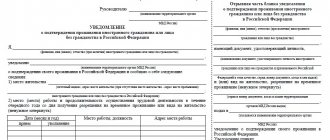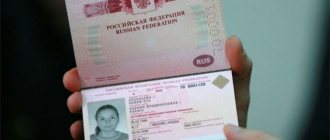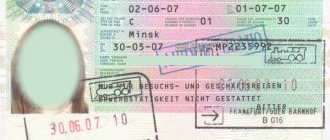What is a place of residence?
Everyone needs a roof over their head, warmth and comfort. We all live in premises designated for this purpose as an owner, tenant, or for other reasons.
Place of residence is a residential property where a citizen lives permanently or primarily. It could be:
- his own home;
- premises used under a lease (sublease) agreement or on other grounds provided for by the laws of the Russian Federation.
As a rule, this is an apartment or residential building at the address of which registration at the place of residence is carried out. The fact that a citizen is registered there can be judged by the corresponding stamp in the passport.
When changing place of residence (for example, in connection with moving to another locality), a citizen is obliged to apply for registration at the new address within seven days from the date of arrival. This norm is enshrined in Art. 16 Decree of the Government of the Russian Federation of July 17, 1995 N 713.
Registration at the place of residence is carried out on the basis of:
- the applicant's identity documents;
- a document giving the right to move into a residential premises (for example, a certificate of ownership);
- statements in the prescribed form.
If the person being registered is not the owner of the residential premises, consent will be required from the citizen who has the right of ownership.
Registration of a child at the place of residence of one of the parents
Passport office at registration address
- call the Main Department of Migration Affairs of the Ministry of Internal Affairs at your place of residence, the department employee will tell you the number you need to contact to find out your passport office;
- by personally going to the migration service department and checking the data with the employees;
- using the official website of the Main Department of Migration Affairs of the Ministry of Internal Affairs, selecting your region of residence.
- Extract from previous place of residence. The citizen will receive a departure slip, which must be presented when registering at a new address. When the deregistration mark is received, the citizen must collect documents.
- The required documents include a passport, papers confirming the right to an apartment, and the consent of the owner if the applicant is registered in his apartment.
- The documents are given to the passport office employee at the place of residence, and a registration application is filled out. Instead of the applicant, the paperwork can be filled out by an authorized person, in which case a power of attorney and his passport will be required.
- If children under 14 years of age are registered, their registration takes place in the presence of their parents. Children over 14 years old have the right to fill out the paperwork themselves.
We recommend reading: Check the cadastral number of a land plot in the Moscow region at the address
Legislative regulation
The concept of place of residence is given in Art. 2 of the Law of June 25, 1993 No. 5242-1. Before it came into force, the term “registration” was used, which was permanent and temporary. By analogy, registration at the place of residence is permanent.
The main purpose of registration of citizens on the territory of Russia is to provide them with the opportunity to move freely, while unhindered receipt of government services. Thus, the rights, freedoms and legitimate interests of every citizen of the Russian Federation are respected. For example, the possibility:
- employment;
- transfer of pensions and other social payments;
- receiving medical care;
- registering a child in a preschool or school institution;
- receiving social guarantees, etc.
Registration address, residence address, permanent residence
If a citizen moves to a different address due to the performance of official, military and other duties for a short period of time, then his deployment qualifies as a place of stay. This means a short-term change of place of residence, after which the person is expected to return to the address indicated during state registration as the main place of residence. For example, when sending employees to another city, the employing company temporarily rents apartments for their accommodation for 2 months. In this case, you need to register temporarily at the passport office.
We recommend reading: Benefits for Group 3 Disabled Persons in 2021 for Maintenance of Housing and Utilities Latest News
Registration address (official registration) - permanent place of residence, which is placed on the fifth page of the passport in the form of a stamp. The Civil Code distinguishes three main terms relating to the dislocation of people and assigning it to certain territorial bodies:
How is it different from the place of actual residence?
From the legislative side, a citizen’s place of residence is the residential premises where he is registered. This is confirmed by a stamp in the passport. In fact, he may live in another room. If it is located within the same region as the place of permanent registration, then there is no need to issue temporary registration.
In the case where a citizen actually resides in another region for a period of more than 90 days, a certificate of temporary “registration” will be required.
For example, let's take the case of a young married couple. They do not have their own housing, so they left the addresses of their parents’ apartments as permanent registration. But in fact, they rent housing located in the same area where they live.
Temporary registration is not required there; it is not contrary to the law. When applying for government services (for example, to enroll a child in a preschool), this can be done at the place of actual residence. Initially, the interests of children according to their “registration” will be taken into account, and then, if there are free places, I can take those actually living in the area.
What is a residential address, registration address? What is the difference
It is still allowed in Russia to be registered (registered) at one address, but actually live in another place. But a bill is being considered that would prohibit housing any person for a period of more than (?) without registration. The fines for violations offered, as always, are not childish.
In every passport of a citizen of the Russian Federation there is a page entitled PLACE OF RESIDENCE, this page must be stamped with the region, the local police department and in giant letters REGISTERED and then the address - this is the registration of the place of residence.
Place of registration: understanding the concept
In simple terms, the place of registration is the address that is written in a person’s documents:
- in the passport (in case of permanent registration);
- in a specially issued certificate (in case of temporary registration or issued to children under 14 years of age who do not yet have a passport).
Quite often situations arise when a citizen does not live at the address recorded in the documents. What should I do? When do you need to notify the migration authorities and is it necessary to do this at all? In this case, is registration a place of residence or a place of stay? Where and when to contact when changing address?
Let us present the basic meanings of each of the terms to differentiate them more clearly.
Place of residence – permanent
The length of stay in an apartment (house) is the main component of the answer to the question of what is a citizen’s place of residence.
The grounds for living in residential premises are the rights of the owner, the rental agreement and other components provided by law.
Objects of continuous residence are:
- house or apartment;
- your own housing (as an owner), service or rented;
- boarding houses.
You must register at your place of regular residence within 7 days after moving in. Traditionally, it is believed that the place of residence is the address recorded in the stamp in the passport.
To do this, you need to provide the following to the territorial offices of the Main Directorate for Migration of the Ministry of Internal Affairs:
- passport;
- sample application;
- grounds for registration of moving into the premises (ownership rights or lease agreement);
- if the person is not the owner of the apartment, the consent of the owner of the living space is attached.
Such rules are relevant not only for Russian citizens, but also for foreign ones. In this case, the place of residence is considered to be the place where the foreign citizen permanently resides for a long time legally.
Place of residence – temporary
The premises in which a citizen lives temporarily is called a place of stay. These include short-term rented apartments, boarding houses, hotels, etc.
Registration at the place of residence of a Russian or foreign citizen requires strict adherence to the following deadlines:
- Russians who live at an address that does not match the one indicated in their passport (permanent registration) must notify government agencies 90 days after moving in. Previously, a certificate of temporary registration, which means at the place of stay, could not be issued;
- The law requires foreigners to register for migration (perform temporary registration) within 7 days from the date of crossing the border. Separate conditions exist for citizens of Tajikistan (15 days) and citizens of EAEU member countries (30 days).
By the way, in case of check-in into “state-owned” premises (hotels, hospitals, etc.), the administration of these institutions deals with registration issues. You should also know that the address of the place of residence is, in fact, the address of the residential premises in which a citizen lives temporarily - for six months or a year. A person can exercise civil rights indicating this location during the validity period of the documents. This is especially true for migrants.
It often happens that a citizen, being registered in one place, lives primarily in another, so the question: is temporary registration a place of residence is quite natural in this situation. More on this in the following sections.
The main differences between the terms “place of residence” and “place of stay”
Taking into account the above, we can draw conclusions about the main differences characterizing the concepts of “place of residence” and “place of registration”:
- duration of stay;
- grounds for moving in;
- type of accommodation facility;
- completed documents to confirm the fact of residence;
- responsibility for registration;
- the scope of civil rights to which a citizen has access.
We see that how long a person stays in the premises and what rights he has to this living space determine the key difference between the place of stay and the place of residence.
Let's also say a few words about documents that confirm the fact and method of registration of a person at a certain location.
The address of the “place of residence” is most often formalized as “permanent registration” and looks like:
- as a stamp in a passport (for adults and children over 14 years old);
- as evidence - Form No. 8 of the Administrative Regulations of the Ministry of Internal Affairs of the Russian Federation for the provision of state services for registration (Order of the Ministry of Internal Affairs of Russia dated December 31, 2021 No. 984) - for children under 14 years of age who do not yet have a passport;
- as a mark - Appendix No. 4 of the Administrative Regulations of the Ministry of Internal Affairs of the Russian Federation (Order of the Ministry of Internal Affairs of Russia dated November 23, 2021 No. 881) - for foreign citizens, etc.
When listing how the place of residence differs from the place of stay, it is worth mentioning documents to confirm temporary location as another differentiating aspect. After all, the fact of registration at a temporary address is confirmed solely by a certificate. Its variety is also different - form No. 3 is used. Documents according to form No. 3 and No. 8 are issued in person upon registration of the fact of “moving into” the premises and are issued individually to the citizen. The fact of registration is also confirmed by a registration certificate in Form No. 9; it is ordered additionally and contains information not about one citizen, but about all those registered in a given apartment (house).
Speaking about a person’s civil rights and his access to public services (education, medicine, etc.) at his place of residence or place of stay, it will be useful to know the following:
- all rights are exercised at the place of primary residence;
- in case of temporary registration, access to public services is limited to the period for which the certificate was issued.
The practical significance of residence
An accurate determination of the place of residence is essential for protecting the rights and interests of citizens and ensuring state interests.
The need to know the exact place of residence of a citizen arises when resolving a number of legal issues and the fulfillment by citizens of their rights and obligations, including civil, family, administrative and procedural. The lack of registration at the place of residence prevents the implementation of a number of fundamental rights and freedoms of citizens recognized and guaranteed by the Constitution of the Russian Federation, in particular the rights:
- to freely use their abilities and property for entrepreneurial and other economic activities not prohibited by law;
- freely and fully use and dispose of property, freely move goods, services and financial resources;
- for social security, medical care, preschool and school education;
- determining the place of residence of minors under 14 years of age and citizens under guardianship;
- civil registration;
- registering those in need of improved housing conditions and providing housing in state and municipal housing funds;
- be registered as a taxpayer - an individual;
- appeals to judicial authorities and participation in civil proceedings, as well as in enforcement proceedings;
- to receive official calls, notifications, notices, including subpoenas;
- to accept the inheritance, because The place of opening of the inheritance is the last permanent place of residence of the testator.









